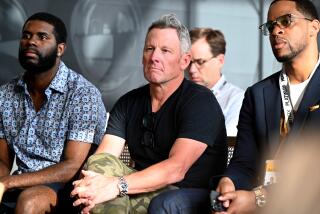Conte advises anti-doping group
- Share via
LAUSANNE, SWITZERLAND — On the day that the International Olympic Committee erased Marion Jones from the record books, BALCO founder Victor Conte met with the head of the World Anti-Doping Agency but did not identify athletes who have used steroids and other banned performance-enhancing drugs.
Conte requested Wednesday’s meeting with Dick Pound in New York to discuss doping among Olympic athletes. Since Conte was released from prison after serving time for steroid distribution through his Bay Area laboratory, he has offered to help rid sports of its drug problem.
“It was inaccurately reported before the meeting that I would be naming names, but that was never my intention nor is that what occurred today,” Conte said in an e-mail to media outlets, including The Times.
“Without naming the athletes, I did provide specific information regarding how athletes involved with doping around the world are so easily able to circumvent the anti-doping procedures in place.”
Conte said on Monday in an e-mail that he wanted to meet with anti-doping officials before the International Olympic Committee reallocated Jones’ Olympic medals. In that e-mail, Conte had said he would “share specific knowledge of past and present Olympic-caliber athletes, coaches and suppliers involved with doping around the world. . . .”
After the meeting, Pound told the Associated Press: “We talked about the macro and systemic problems and his perspective on that, his thoughts on how we could get better at what we do. I think we’ll probably stay in touch. . . . We’ll try to get a better handle on what he knows directly and what he knows as having been part of an overall operation.”
Pound also sees Conte as a credible source despite his past.
“He’s credible in the sense of knowing what has happened and what was going on,” Pound said. “It’s part of something he did in the past. That’s behind him, and he’d like to now do what he can to make things work better.”
Half a world away, the IOC met and formally stripped Jones of her five medals from the Sydney Games. The move was not unexpected after Jones admitted two months ago to having used performance-enhancing drugs beginning in September 2000, when the Games were held.
Jones, 32, won golds in the 100 meters, 200 meters and 1,600-meter relay and bronzes in the long jump and 400 relay. The other U.S. women who ran on those relays also could lose their medals.
The committee also disqualified Jones from the 2004 Games, where she finished fifth in the long jump, and reserved the right to ban her from any coaching or competitive activities.
But the panel held off reallocating the medals, concerned that evidence about doping may yet emerge involving some of the 29 athletes from seven countries who stand to gain from her loss.
“We will only redistribute medals when we are sure the BALCO case will not reveal further issues,” IOC President Jacques Rogge said.
The IOC said it would ask the U.S. Justice Department for more documents related to the Bay Area Laboratory Co-operative scandal. About two dozen athletes allegedly received performance-enhancing drugs from BALCO, which was raided by investigators in September 2003.
Conte, for one, seemed hopeful in Wednesday’s e-mail.
“Pound asked what changes I would make if I were the king of the world of anti-doping for a day,” Conte said. “As someone who was able to evade their system for so long, it was easy for me to point out the many loopholes that exist and recommend specific steps to improve the overall effectiveness of their program.
“Because Mr. Pound was so receptive to the insight I provided, I do believe there will be effective changes made that will benefit of the world of sport.”
Pugmire reported from Los Angeles. Hersh covers the Olympics for The Times and the Chicago Tribune.
More to Read
Go beyond the scoreboard
Get the latest on L.A.'s teams in the daily Sports Report newsletter.
You may occasionally receive promotional content from the Los Angeles Times.





